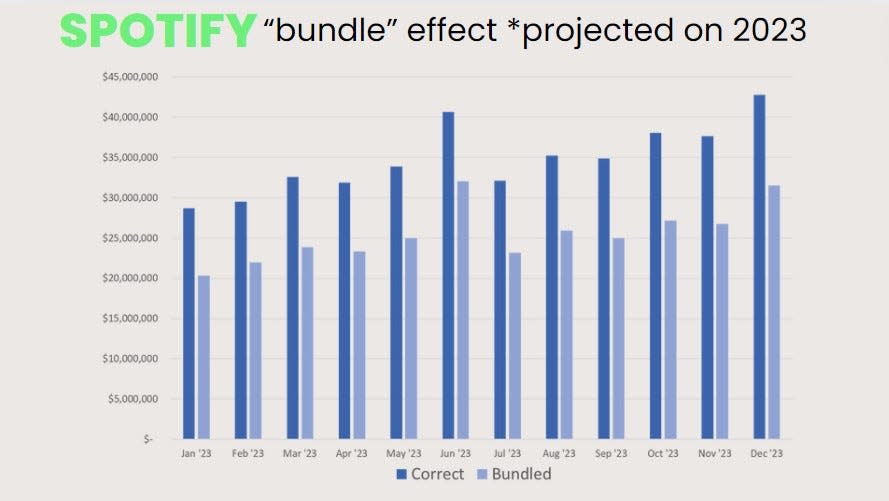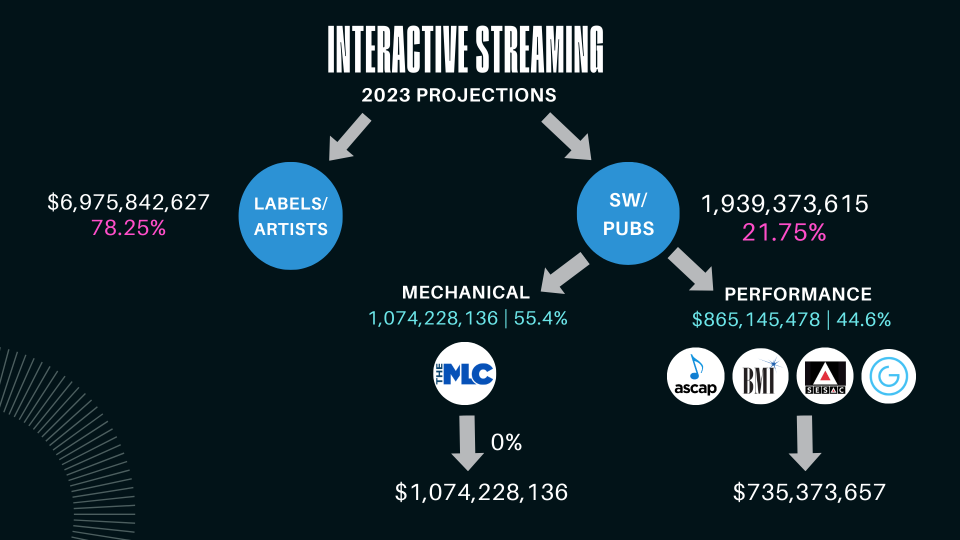Spotify royalty controversy escalates with lawsuit seeking 'recovery of unpaid royalties'
The heat on Spotify for alleged underpayment of song royalties escalated late Thursday as the Nashville-based Mechanical Licensing Collective filed legal action against the streaming service in the United States District Court for the Southern District of New York.
The lawsuit comes on the heels of stern warnings sent to Spotify from multiple songwriting agencies including the Nashville Songwriters Association International, the National Music Publishers Association and the Association of Independent Music Publishers.
In February, the MLC brought a lawsuit against music streaming service Pandora for underpayment of royalties.
The Mechanical Licensing Collective was formed after 2018's Music Modernization Act and is responsible for administering the blanket compulsory license for the use of musical works by digital music services, meaning that it collects royalties owed to songwriters for songs played on streaming services.
In a statement, the MLC said the action, "...seeks recovery of unpaid royalties due under the compulsory mechanical blanket license obtained by Spotify to reproduce and distribute musical works in the United States via its consumer music streaming platform."

In March of 2024, Spotify "bundled" its music streaming plan with audiobooks, which altered the rate in which royalties would be paid. Currently, Spotify subscribers cannot access a music-only subscription, although Spotify says that is in the works, but cannot say when that will become active.
The MLC asserts that Spotify's actions are unlawful and has taken this legal action to attempt to ensure that Spotify pays all royalties due from its use of songs on premium plans.
In a statement, the MLC's CEO Kris Ahrend said that the MLC was designated by the Register of Copyrights to administer the blanket license and is the only entity with the statutory mandate to collect and distribute blanket license royalties and take legal action to enforce royalty payment obligations.
“The MLC takes seriously its legal responsibility to take action on behalf of our members when we believe usage reporting and royalty payments are materially incorrect," the statement said.
Pandora suit: Music governing body sues Pandora for allegedly underpaying royalties
Spotify issued the following statement on the legal action brought against the company, but declined to comment beyond the statement:
"The lawsuit concerns terms that publishers and streaming services agreed to and celebrated years ago under the Phono IV agreement. Bundles were a critical component of that settlement, and multiple DSPs include bundles as part of their mix of subscription offerings. Spotify paid a record amount to publishers and societies in 2023 and is on track to pay out an even larger amount in 2024. We look forward to a swift resolution of this matter."
Nashville Songwriters Association International's Executive Director Bart Herbison says the MLC lawsuit is based on a correct interpretation of the stream service eliminating standalone music subscriptions and only offering music in a bundle.
"Because bundles pay less to American songwriters, the loophole will result in Spotify reducing compensation to them by $150 million each year as founder Daniel Ek cashed in a reported $180 million in stocks over recent months — $118 million in proximity to the bundling move," Herbison said in an email to The Tennessean. "Spotify’s history speaks for itself when it comes to failing to value the creators whose creations are the foundation of their product."

David Israelite, president and CEO of the National Music Publishers Association, told a group gathered at an AIMP Nashville chapter State of the Union for Music Publishing event, that despite working with Spotify through multiple phases of talks over songwriter royalty infringements, Spotify has opted to, what Israelite says is "manipulate the agreement and pay songwriters less."
"About 13 years ago we found them in a massive infringement situation," Israelite said during the conference. "And we had to make a hard decision about whether or not we wanted to sue them and probably end their existence. Or whether we wanted to try to figure out how to make their business work so that they could make money so that songwriters could make money. We chose the path of partnership at that time. And so we figured out a way to deal with their massive infringement."
Israelite added after the MLC lawsuit was made public late Thursday, that the NMPA applauded the MLC for standing up for songwriters and not letting Spotify "get away with its latest trick to underpay creators."
"The MLC is tasked with challenging services who falsely report royalties, and we commend their swift action.," Israelite's statement read. “The lawsuit sends a clear message that platforms cannot improperly manipulate usage — in this case unilaterally redefining services as a bundle — in order to devalue music. We strongly support the MLC and will continue to pursue justice.”
Melonee Hurt covers music and music business at The Tennessean, part of the USA TODAY NETWORK — Tennessee. Reach Melonee at [email protected], on X @HurtMelonee or Instagram at @MelHurtWrites.
This article originally appeared on Nashville Tennessean: Spotify royalty controversy: Lawsuit clams unpaid royalties
